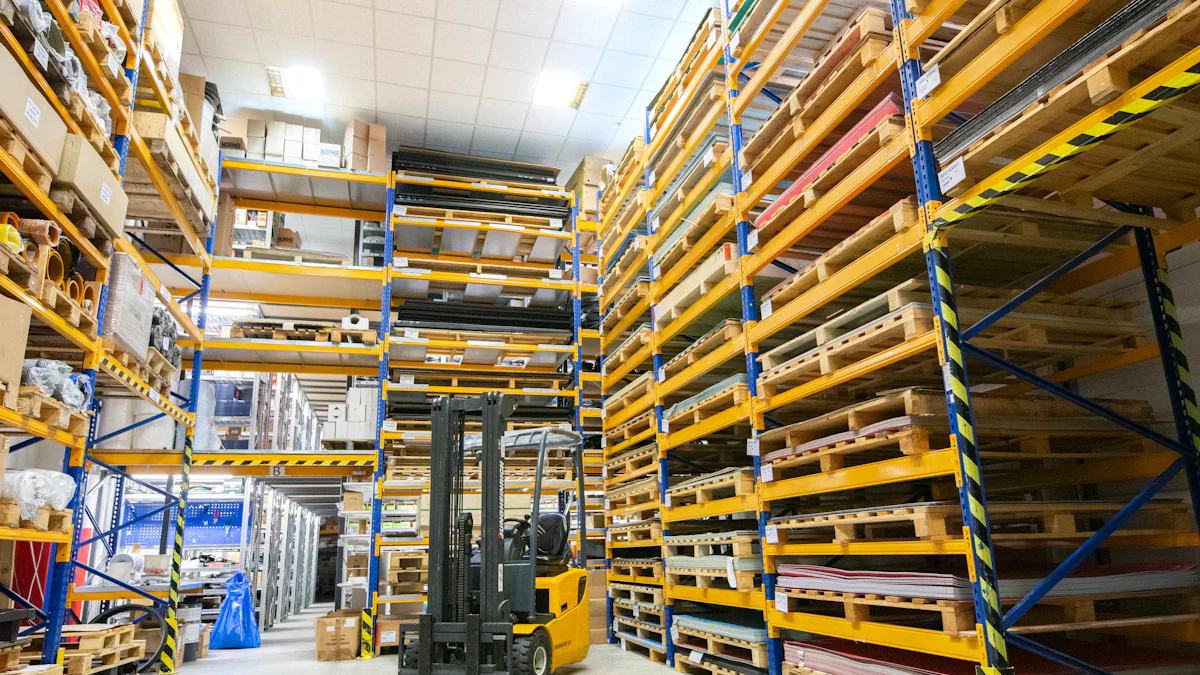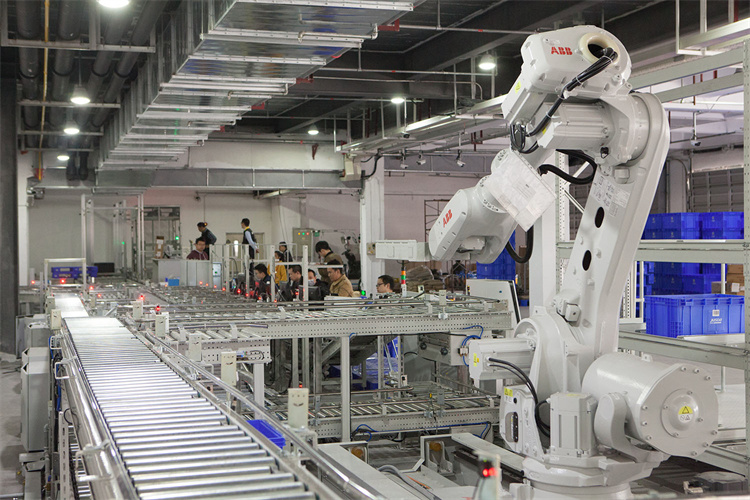The Future Landscape of Inventory Management

In the realm of modern business, inventory management stands as a cornerstone for operational efficiency and sustainable growth. The current practices underscore the delicate balance between supply and demand, shaping the success trajectory of enterprises. As we navigate through the complexities of today's market dynamics, it becomes evident that embracing future trends in inventory management is not just an option but a strategic imperative. This blog embarks on a journey to unravel the forthcoming innovations and transformative technologies that will redefine how businesses optimize their inventory processes.
Current Challenges in Inventory Management
Inefficiencies in Traditional Systems
Manual Processes
Implementing an automated inventory management system can revolutionize operational efficiency. By transitioning from manual processes to automated solutions, businesses witness a remarkable reduction in holding costs and an improvement in data availability. The shift towards automation accelerates the inventory turn rate, ensuring a seamless flow of goods through the supply chain.
Lack of Real-time Data
The absence of real-time data poses a significant hurdle in maintaining optimal inventory levels. With automated inventory control systems, businesses experience enhanced accuracy and visibility into stock movements. This transformation not only saves costs but also reduces waste, paving the way for streamlined operations and improved decision-making processes.
Supply Chain Disruptions
Globalization and Complexity
In the era of globalization and intricate supply chains, efficient inventory management becomes paramount. Addressing the challenges posed by global markets requires a proactive approach to optimize inventory levels. By leveraging advanced technologies, businesses can navigate through complexities with ease, ensuring a seamless flow of products across borders.
Unpredictable Demand
Fluctuations in demand patterns often catch businesses off guard, leading to stockouts or overstocking situations. Embracing innovative solutions that enable accurate demand prediction is crucial for mitigating risks associated with unpredictable market trends. Through AI-driven inventory management tools, companies can anticipate demand shifts and align their resources effectively.
Cost Management
Overstocking and Understocking
Balancing between overstocking and understocking is a delicate art that impacts financial performance significantly. Automated inventory control systems offer precise insights into stock levels, enabling businesses to optimize their inventory holdings efficiently. By eliminating excess stock or shortages, companies can reduce storage costs and enhance overall cost-effectiveness.
Storage and Handling Costs
Managing storage and handling costs is a critical aspect of effective inventory management strategies. Automation plays a pivotal role in optimizing storage space utilization while minimizing handling expenses. By implementing smart warehouse solutions, businesses can streamline their operations, reduce overheads, and ensure efficient utilization of resources.
Emerging Technologies and Solutions

Automation and Robotics
Automated Warehouses
In the realm of inventory management, the integration of automation and robotics is reshaping warehouse operations. Automated warehouses leverage cutting-edge technologies to streamline processes, from goods receiving to shipping. These systems enhance efficiency by accelerating picking speed, reducing errors, and optimizing space utilization within facilities.
Drones and Autonomous Vehicles
The utilization of drones and autonomous vehicles in inventory management heralds a new era of innovation. These aerial and ground-based technologies offer swift and precise inventory tracking capabilities. By deploying drones for aerial surveillance and autonomous vehicles for ground logistics, businesses can achieve unparalleled speed and accuracy in managing their stock.
Artificial Intelligence and Machine Learning
Predictive Analytics
Harnessing the power of artificial intelligence (AI) and machine learning (ML) unlocks the potential for predictive analytics in inventory management. These advanced algorithms analyze historical data to forecast demand patterns accurately. By predicting future needs, businesses can optimize their stocking levels, minimize shortages, and maximize operational efficiency.
Demand Forecasting
The advent of AI-driven solutions revolutionizes traditional demand forecasting methods. Through sophisticated algorithms, businesses can anticipate market trends with precision. By leveraging AI-powered tools for demand forecasting, companies gain a competitive edge by aligning their resources effectively with fluctuating customer demands.
Internet of Things (IoT)
Real-time Tracking
The implementation of Internet of Things (IoT) technology enables real-time tracking of inventory movements. IoT sensors embedded within storage units provide instantaneous updates on stock levels and locations. This real-time visibility empowers businesses to make informed decisions promptly, ensuring optimal stock management at all times.
Smart Shelves and Sensors
Integrating IoT-enabled smart shelves and sensors transforms conventional inventory control practices. These intelligent systems automatically monitor product quantities, detect discrepancies, and trigger reorder notifications when stock levels are low. By embracing smart shelf technology, businesses enhance accuracy in inventory tracking while minimizing manual intervention.
Future Projections and Trends

Integration of Blockchain
Blockchain technology is revolutionizing the landscape of inventory management by offering enhanced transparency and secure transactions. The integration of blockchain ensures a tamper-proof record of all inventory movements, fostering trust and accountability throughout the supply chain. By leveraging this decentralized system, businesses can streamline operations, mitigate fraud risks, and optimize inventory tracking processes.
Enhanced Transparency
The implementation of blockchain technology introduces a new era of transparency in inventory management practices. Each transaction recorded on the blockchain is immutable and transparent, providing stakeholders with real-time visibility into stock movements. This heightened transparency fosters trust among partners, enhances traceability, and minimizes discrepancies in inventory records.
Secure Transactions
Blockchain's inherent security features make it an ideal solution for ensuring secure transactions within inventory management systems. By utilizing cryptographic algorithms and distributed ledgers, blockchain technology safeguards sensitive data from unauthorized access or alterations. This robust security framework not only protects against cyber threats but also instills confidence in business transactions.
Sustainable Practices
Embracing sustainable practices in inventory management is imperative for fostering environmental responsibility and operational efficiency. Eco-friendly packaging solutions play a pivotal role in reducing carbon footprints and minimizing waste generation throughout the supply chain. By adopting sustainable packaging materials, businesses can align with eco-conscious consumer preferences while contributing to a greener future.
Eco-friendly Packaging
The adoption of eco-friendly packaging materials reflects a commitment to sustainability within inventory management strategies. Biodegradable alternatives, recyclable packaging, and minimalistic designs are key components of eco-friendly packaging solutions. These initiatives not only reduce environmental impact but also resonate with environmentally conscious consumers seeking ethically sourced products.
Waste Reduction
Efficient inventory management practices focus on waste reduction as a core sustainability objective. By optimizing inventory levels, minimizing overstock situations, and implementing just-in-time inventory strategies, businesses can significantly reduce waste generation across their operations. This proactive approach not only conserves resources but also enhances cost-effectiveness and operational resilience.
Customization and Personalization
Tailoring inventory solutions to meet specific customer needs is a hallmark of successful inventory management strategies. Customization enables businesses to offer personalized product assortments, cater to niche market segments, and enhance customer satisfaction levels. By embracing customer-centric approaches in inventory planning, companies can build brand loyalty and drive long-term growth opportunities.
Tailored Inventory Solutions
The provision of tailored inventory solutions allows businesses to address unique customer demands effectively. Through data-driven insights and predictive analytics tools, companies can customize stocking levels based on historical trends and individual preferences. This personalized approach optimizes inventory turnover rates, minimizes excess stock holdings, and maximizes customer value propositions.
Customer-centric Approaches
Adopting customer-centric approaches in inventory management entails prioritizing customer needs at every stage of the supply chain process. By integrating feedback mechanisms, conducting market research analyses, and implementing agile inventory adjustments based on demand fluctuations, businesses can enhance overall customer experiences. This proactive engagement fosters brand loyalty while driving sustainable growth trajectories for enterprises.
Effective inventory management is crucial for businesses to adapt and anticipate future changes, remain competitive, and successful in the longer run.
Embracing technology-driven solutions is crucial for the future of restaurant inventory management.
Adapting to inventory management trends is crucial for retailers to succeed in the retail industry.
Proactive responses to market demands are crucial for successful inventory controls.
Embracing evolving technology in inventory management is crucial for business success.
Staying ahead of industry trends and optimizing strategies can boost business efficiency and competitiveness.
See Also
Tomorrow's Logistics Revolution: AI in the Supply Chain
High-Tech Warehouse Benefits: Automation in the Future
Advanced Techniques Empowering Business Inventory
